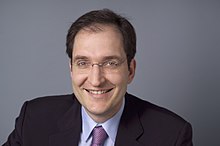Peter Seeberger
Peter H. Seeberger (born November 14, 1966 in Nuremberg ) is a German chemist.
Life
Peter Seeberger studied chemistry at the University of Erlangen-Nürnberg and received his PhD in biochemistry from the University of Colorado at Boulder in 1995 as a Fulbright scholar . After a post-doctoral assignment at the Sloan Kettering Institute for Cancer Research in New York, he became an Assistant Professor at the Massachusetts Institute of Technology (MIT) in 1998 and was promoted to Firmenich Associate Professor of Chemistry there in 2002 .
From 2003 he was Professor of Organic Chemistry in the Department of Chemistry and Applied Biosciences at ETH Zurich and Affiliate Professor at the Burnham Institute in La Jolla , California. Since summer 2008 he has headed a department at the Max Planck Institute for Colloids and Interfaces in Golm near Potsdam.
Peter Seeberger is a leading scientist in the field of glycobiotechnology ( glycomics ).
For the development of an automatic synthesis machine for carbohydrates ( oligosaccharide synthesis ) he received the 2007 Körber European Science Prize, endowed with 750,000 euros . This enabled Peter Seeberger and his team to artificially produce known glycans from pathogens and process them into candidate vaccines against malaria , leishmaniasis , AIDS , anthrax and tuberculosis .
In 2008, the science journalist turned Dirk Pohlmann for ZDF documentation Sugar Code: secret weapon against cancer and malaria? , in which he presented in detail Seeberger's research.
In 2012, Seeberger founded ArtemiFlow GmbH in Potsdam / Golm to advance the development and application of a reactor for the production of artemisin as a basic ingredient in a malaria drug, and appointed Dirk Pohlmann as its CEO . This aimed at a production in Vietnam in order to avoid the European high wage level. The prospect of almost halving the previous production costs for Artemisin from $ 480 to $ 250 per kilo was promised. He accused the Bill & Melinda Gates Foundation , which, according to Pohlmann, had built up a “monopoly position in the financing of the international fight against malaria,” of rejecting the ArtemiFlow method “without justification” and instead using a method developed by Jay Keasling Extraction of artemisin from genetically modified yeast. However, the foundation had already invested 50 million dollars in this. Competitor Keasling also wanted to reduce the price of an artemisin dose from $ 2.40 to $ 0.25. In 2017, Seeberger dismissed Pohlmann as managing director of ArtemiFlow and took over the management himself. The Gates Foundation is now in talks again and at the beginning of 2018, Artemisin production could begin in Kentucky with the first test facility.
Seeberger has been Editor-in-Chief of the Beilstein Journal of Organic Chemistry , an open access journal for organic chemistry, since May 2011 .
Awards
- 2004: Klung Wilhelmy Weberbank Prize ;
- 2007: Körber Prize for European Science ;
- 2009: Claude S. Hudson Award ;
- 2013: Member of the Berlin-Brandenburg Academy of Sciences
- 2017: Science Award: Research between Basics and Applications ;
- 2018: Ernst Hellmut Vits Prize ;
- 2020: Emil Fischer Medal for Organic Chemistry
literature
- Catarina Pietschmann: Sugar chains from the machine, in: MaxPlanckResearch Heft 2/2013, pages 54–59, online
Web links
- Page by Peter H. Seeberger
- Page from Seeberger's department at the Max Planck Institute for Colloids and Interfaces
- Former ETH Zurich website: Peter H. Seeberger ( Memento from February 8, 2007 in the Internet Archive )
- Page about Seeberger on the Max Planck Society's website
- Peter Häusler: The future is sweet. in: DIE ZEIT, August 30, 2007
- Körber Prize 2007, winners brochure
Individual evidence
- ↑ [1]
- ↑ [2]
- ↑ Reactor extracts malaria drug from waste. In: ingenieur.de. February 26, 2014, accessed December 31, 2014 .
- ↑ Science @ Berkeley May 30, 2006 Article: An Age-Old Microbe May Hold the Key to Curing an Age-Old Affliction
- ↑ [3] , Moneyhouse information on ArtemiFlow GmbH
- ↑ Potsdam researchers revolutionize the active ingredient in malaria
- ↑ Berlin-Brandenburg Academy of Sciences elects seven new members to the Science Information Service (idw-online.de), accessed on June 14, 2013
- ↑ Pioneer in Glycosciences: Peter Seeberger receives Stifterverbandspreis 2017. Max Planck Society, June 13, 2017, accessed on March 6, 2018 .
- ↑ GDCh Awards 2020 / DBG Awards 2020 . In: Angewandte Chemie International Edition . June 11, 2020, doi : 10.1002 / anie.202005849 ( wiley.com ).
| personal data | |
|---|---|
| SURNAME | Seeberger, Peter |
| ALTERNATIVE NAMES | Seeberger, Peter H. |
| BRIEF DESCRIPTION | German chemist |
| DATE OF BIRTH | November 14, 1966 |
| PLACE OF BIRTH | Nuremberg |
